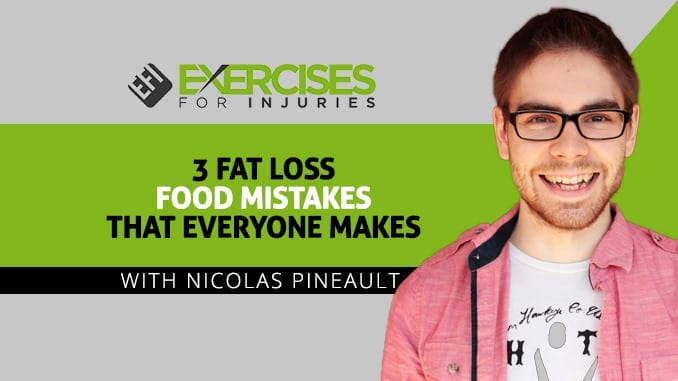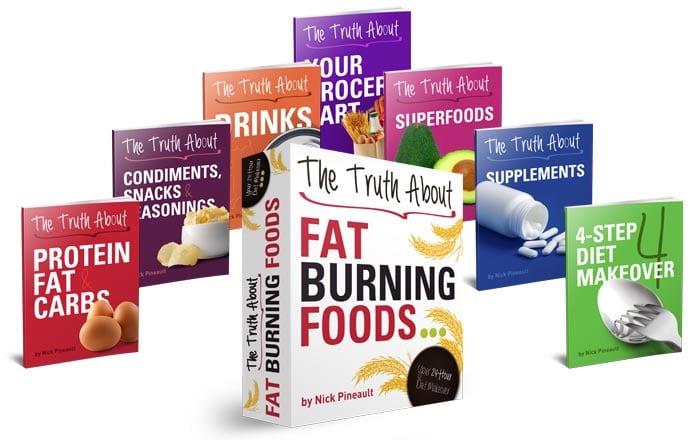
It’s not easy to lose fat while preserving muscle mass. It takes a detailed knowledge of your body and an awareness of what you eat. It can be tricky to stay on track with your fat loss food mistake when so many tempting food options exist. Fortunately, there are ways to combat the common pitfalls many people stumble upon when trying to slim down. There is no shortage of diets and fad programs that help you lose fat faster than other methods.
I got Nick Pineault back again.
A few months back, he was on EFI talking about foods that help with pain relief. Now he is back to chat about three fat-loss food mistakes that everyone makes. Enjoy the interview ~ Rick Kaselj, MS
CLICK HERE to watch the YouTube video.
Rick Kaselj: Hey, this is Rick Kaselj from ExercisesForInjuries.com. I want to welcome you to another video interview. In this video, I will interview Nick Pineault, whom I interviewed before. I interviewed him back a couple of months after discussing the pain-free diet.
I met Nick, and we exchanged emails over the internet. We met a few months back in Denver and had a good chat there. And we also ran into each other a couple of weeks ago in San Diego. Today, we will talk about the fat loss side of things.
So, Nick, I will get you to introduce yourself to the listeners, viewers, and readers of exercisesforinjuries.com.
Who is Nick Pineault?
Nick Pineault: Sure, thanks, Rick. Thank you for having me. It’s always a pleasure. First, I am Nick Pineault; you can get by my name. I’m a Canadian and am now in Montreal, Quebec.
You can visit me here, in Montreal, if you want. It’s a great place.
Rick Kaselj: I will.
Nick Pineault: Sure, you must come here in summer, though, because the weather is way too cold, -5 degrees Celsius.
My nickname is the “Nutrition Nerd.” Many people started calling me this because I always have something to say about ingredients in food, and I am passionate about this stuff.
People often asked me what kind of credentials I could show them or big fancy golden diplomas on my walls. I don’t have any of those.
My background is in communications. I studied for four years at the University of Communications. I consider myself more of a journalist than a nutrition expert per se.
That being said, my passion lies in Nutrition. In the past seven years, I studied everything online and read thousands of articles and books, trying to decipher and find what’s true and what’s not true about certain myths that we hear everywhere in the media.
I am really about trying to find the deal with all of this information on the internet, whether it’s true or not.
Rick Kaselj: In the last interview, we talked about pain-relieving foods. And in this video, we are going to talk about fat-burning foods. Let’s look into it and pretend we walk into someone’s kitchen. What foods that do not burn fat commonly seen in someone’s kitchen would be the foods that do not burn fat?
What is an example of food in everyone’s kitchen that does not burn fat?
Nick Pineault: Good question. I need to look back at how I used to eat because we are not born with nutrition knowledge. No one teaches us this stuff, even in school. So the problem is people are educated, and I used to be, by TV, magazines, and the radio that are mass media.
You probably get the same information sources on the internet because people read the adult-line version of the Wall Street Journal. That being said, the kind of information you get, for example, like margarine, that’s one food I would not recommend eating because, for example, what they say is that it comes from, of course, a big myth of purely unsaturated fat that contains Omega 6, when in fact the problem is the manufacturing process.
Not all people ask about how their food is made because we have other things to do with our lives. You listen to TV, and you see that a brand is being advertised, and you see, yeah, that’s healthy obviously, and even the American Heart Association puts their logo on it, so it must be good. We are busy, and we need to trust someone.
Food Mistake: Actual Manufacturing Process
I’m sorry, but when I looked at the actual manufacturing process, I noticed that these oils extracted from, let’s say, canola, soy, or corn, the common plant oils, are extracted and are fragile. Exposure to any heat, oxygen, or manipulation will make them rancid and creates forms of trans fats.
You should extract them cold press. In that case, they may have their part in your diet, but the problem is those oils are refined. They are refined at high temperatures until the product is filtered and becomes golden and clear. You don’t smell anything, don’t taste much, and think it’s healthy.
Of course, the industry doesn’t want to test those things because it will mean them losing millions. But in fact, one study at the University of Florida revealed that 4.6% transfat is contained in those kinds of oils, and that’s not even on the packaging because the fragile oil leaves traces of damaged fats. So really, that comes back.
Fat damage increases inflammation in your body. Until consumers demand better products, they will continue to be sold or refined in most people’s kitchens. It’s not like they are trying to kill people or give bad products. It’s just that they don’t want to think about it.
Rick Kaselj: Okay. I got an email from you a couple of weeks back highlighting the Olive Oil. And I love Olive Oil. Because my parents are Croatian, we heavily influence the Italians, and pretty much my mom’s secret in any of her cooking is a copious amount of olive oil.
You said we might be buying olive oil, but that olive oil might not be what we think it is. Maybe you can expand on that a little bit.
What is the Italian Mafia doing with your food?
Nick Pineault: Yes, that’s one controversial topic. The one thing I would say because I have learned from my past mistakes is that the information we get is not 100% precise.
You got to take it and verify where the truth in your product is. Research reveals that much olive oil imported from Italy and Spain is fake.
What I mean by fake is that it mixes with, let’s say, corn oil or other olive oil that doesn’t smell or taste like anything. That’s a sad deception for consumers because you have this brand that sells 100% olive oil or even extra virgin oil, which is even the highest grade possible, yet it doesn’t cut. And when you look at the actual product, there are traces or even high percentages of those unhealthy oils we just discussed.
Again you get the trans fat, the damaged fats with free radicals, which accelerate the process that causes inflammation. It’s not that I am making this stuff up. One well-known study shows that olive oil is a big business and people make a lot of money out of it.
For feeding, mixing olive oil with refined oils is as bad as it is criminal. It’s the same thing as selling drugs on the street. People make a lot of money on it, which is risky. But some people do it, and we need to protect ourselves.
Watch Out For These Fat Loss Food Mistaken
Fat Falsities- One major fat loss food mistake is eating too many carbohydrates. Although the carbohydrates found in fruits and vegetables are healthy, they are still carbohydrates. They will digest more quickly than proteins and fats and release more quickly into your bloodstream. This can lead to an increase in insulin levels and make you feel hungry again sooner. Another common fat loss food mistake is failing to eat enough protein. Protein is responsible for satiety, muscle building, and regulating hormones that affect metabolism.
Food Mistake: Verifying the Olive Oil
You got to check out a couple of things. First, there’s the infamous bridge test. It’s not 100% accurate, but if you got a cheap brand of olive oil that’s only labeled olive oil, you could put a little bit of it in the fridge for up to 48 hrs. You need to verify if your olive oil is legit thoroughly. If it solidifies, it is real because it contains a lot of monounsaturated fats like avocado, which become hardened under cold. If it’s still liquid, 100% liquid, then it would probably be, let’s say, corn oil or purely unsaturated fat. It’s not 100% accurate.
Food Mistake: Checking the Product Date
And Another thing that you need to check out is does this product has a date that it will go bad because it should probably be consumed. I think it’s a year maximum after extraction. If it doesn’t have a date, you know it’s cheap. And check if Consumer Reports have reviewed it. The US Davis Olive Center in California tested flavoring to check if the extra virgin mentioned is legit because extra virgin means the taste is good. Probably the Nutrition is good too, so it’s preserved.
Rick Kaselj: Awesome. I had never thought that the Mafia had gotten into olive oil. As you said, it could be a very profitable industry.
Nick Pineault: It is. They’ll probably do a movie about it we call The Olive Oil Godfather.
Rick Kaselj: Forgot about Blood Diamonds. We talked about something that might work against people’s ability to burn fat that’s in their kitchen. It is Olive Oil.
Now, what would be that one thing you recommend to everyone in their kitchen that helps with their fat burning?
What do you recommend people include in their kitchens to help burn fat?
Nick Pineault: I will repeat myself here, but cooking oils are important because you almost use them at every meal. When you cook eggs in the morning and steaks at night, you are always using them in small quantities.
Food Mistake: Suggesting Virgin Coconut Oil
The one thing that I suggest adding for people would be coconut oil. Let’s call it Virgin Coconut Oil is the one which tastes like coconut. Some people like it, and some people hate it. Use it; it contains medium-chain triglycerides. It is basically in the form of fats that your brain can use for immediate energy.
Food Mistake: Cooking Stability
The one important thing when choosing your fats source for cooking is stability. You don’t want it to overcook and overburn because you will do the same thing manufacturers do with their corn oil and soy oil. You will burn the oil and then add all those byproducts created that you don’t want in your body. Long-term, you want to use it in your body every single day. That’s just one that is adding to your kitchen.
Rick Kaselj: Awesome. We come to the end of this interview, any last-minute tips or things you want to leave with the readers, listeners, and viewers?
What to do about BPA in cans of vegetables and fruit?
Nick Pineault: Yes, sure. A lot of people buy beans and lentils in cans. Even I find myself buying them because they are really handy. Maybe just a second tip quick people are really afraid of BPA in cans.
So people have a hard time digesting the beans and lentils because usually, these are hard to digest unless you soak them overnight and then boil them. It is because it contains some toxins that are hard to digest.
In India
Even in India, they soak and boil all their beans and lentils before making them into soups. You have digestive problems when you use the bean and boil it right with no soaking.
That’s one interesting thing because they are a cheap protein source. Most people add beans to their diet, and then they have all those funny jokes around them, obviously because it gives you bloating and all the other side effects. So that’s one little tip to take home that I thought about on the truth about fat-burning foods.
Rick Kaselj: Where can people get more information about you, Nick?
Where can people get more information about Nick?
Nick Pineault: Two things. If you want to know about the latest product I have just released that has reached 10 thousand sales this week. It’s the Truth About Fat Burning Foods. We have reached many people with this product, and I am proud of what we have done.
The Book
In the book, I talked about all those things, like olive oil and coconut oil, went in-depth into each of these ingredients and drinks and supplements, and revealed all the research I have been doing for a couple of years.
Suppose you want to follow me constantly. Head on to NickPineault.com. I am sure Rick will have a blog or a link, or just look me up on Google, and you will eventually find me. I’ve got a lot of stuff every week, like nutrition tips, fat loss, and answers to your eating better and smart choices.
Rick Kaselj: Thank you very much, Nick. Thank you very much for joining me for this interview. And thank you, exercisesforinjuries.com readers, listeners, and viewers.
Make sure you swing by exercisesforinjuries.com. You can type in your injury, and there’s a good chance that I have an article or video on your injury.
Second thing if you are watching this on YouTube, head up above and hit subscribe and what that will do is you will end up getting videos like this and interviews like this every couple of days from me.
Lastly, head down below and let Nick and me know your thoughts about this interview. Hit LIKE or leave us a comment and question, and Nick and I will get back to you.
So this is Rick Kaselj from exercisesforinjuries.com in Vancouver, Canada, and Nick Pineault in Montreal, Quebec, from Truth About Fat Burning Foods saying take care and bye-bye.
Rick Kaselj, MS




